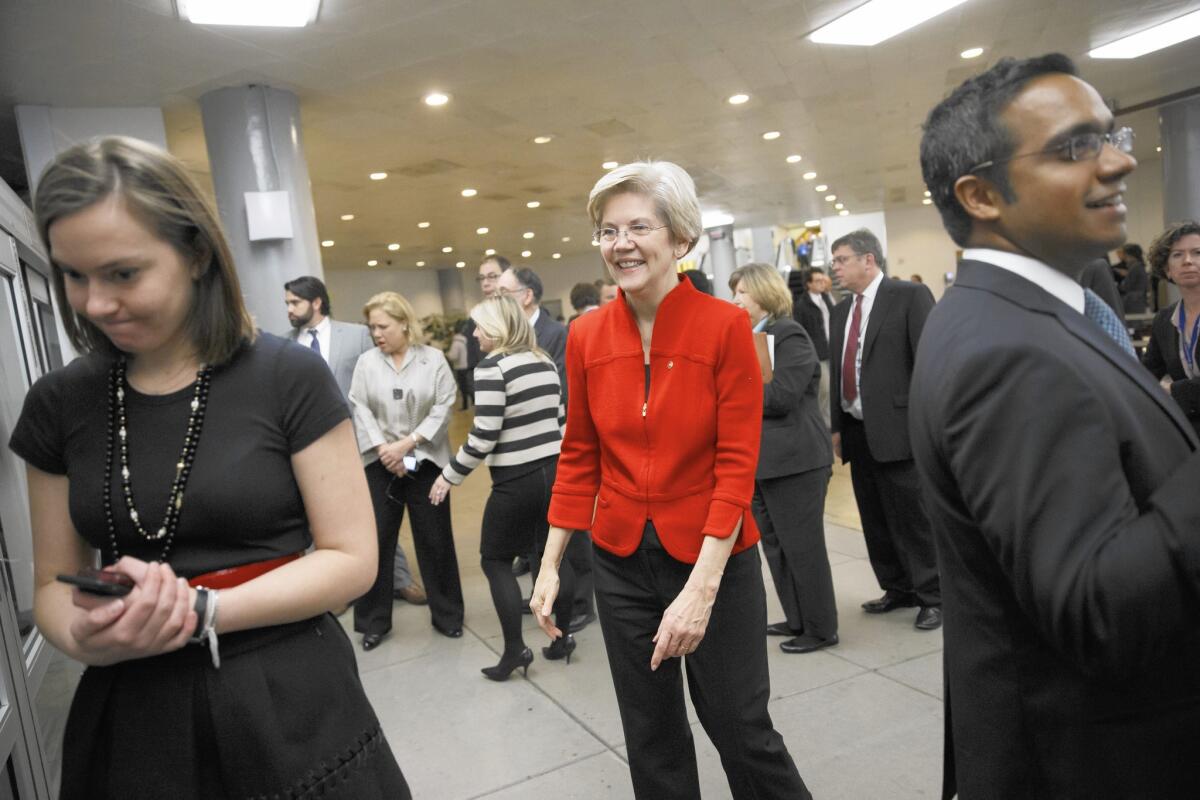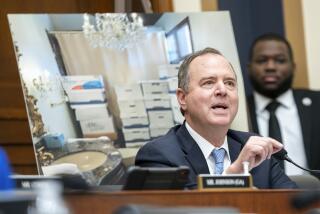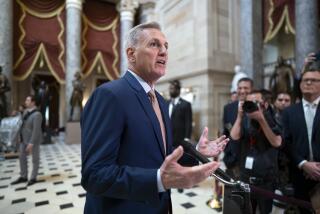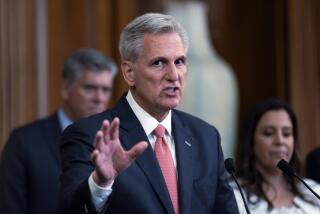President Obama, Democrats face rift exposed by spending bill debate

For much of the last six years, liberal Democrats in Congress have been loyal foot soldiers for their often unpopular president. Now, a rare clash between President Obama and members of his own party suggests Democrats on the left may be marching in a new direction.
Democratic feuding over a $1.1-trillion government funding measure that passed the House on Thursday threw into the open a growing fracture between the president and congressional Democrats, a split that is likely to play a crucial role in the president’s final two years in office.
Blaming Obama for the midterm losses and long resenting his reluctance to court his own natural political constituency, Democrats in the House and Senate blasted the spending bill as a giveaway to Wall Street and big-moneyed interests. The White House said it was the best deal available.
The ultimately unsuccessful revolt that followed, which pitted the president against House Minority Leader Nancy Pelosi (D-San Francisco), signaled Democrats’ new openness to a more hard-line approach and perhaps a new torchbearer.
“I just want our Democrats to feel strong enough to fight — not to cave in, not to be influenced or intimidated,” said Rep. Maxine Waters (D-Los Angeles), expressing liberals’ frustration after an evening of tense meetings Thursday. Democrats will be “putting up a strong fight and getting ready for next year.”
At the heart of this dispute — and the likely clashes coming in the New Year — are the conflicting motivations of a legacy-minded president and comeback-focused Democrats.
While Democrats are searching for ways to flex their muscle after an electoral drubbing in November, the president is looking for ways to tally up some legislative accomplishments before he leaves office. That goal will inevitably mean working with the new Republican majority in the Senate.
The president summed up his approach Friday when he acknowledged there were parts of the massive spending measure he “really [did] not like,” but said it was the best deal on the table.
“Overall, this legislation allows us to build on the economic progress and the national security progress that’s important,” Obama told reporters. “Had I been able to draft my own legislation and get it passed without any Republican votes, I suspect that it would be slightly different. That’s not the circumstance we find ourselves in.”
The measure moved Friday to the Senate, which is expected to pass the bill in the coming days.
The dispute centered on a provision that would raise political contribution limits for rich donors and another that would relax 2010 financial regulations. The proposed easing of Dodd-Frank Act restrictions on derivatives held by banks in particular fired up a lawmaker who has emerged as the face of the new, more strident Democratic wing.
Sen. Elizabeth Warren (D-Mass.) predicted in a Senate speech Thursday that the bill would be used later as a “taxpayer bailout of Wall Street.”
“A lot of people will look back at this vote to see who is responsible for putting the government back on the hook to bail out Wall Street,” she warned.
Obama stepped in late Thursday to personally corral House Democrats behind supporting the spending bill, while Pelosi, long a trusted and effective Capitol Hill enforcer, appeared to be working against him.
Speaking at the same time as Warren across the Capitol, Pelosi said she was “enormously disappointed” that the White House acceded to the GOP-backed provision.
“We’re being asked to vote for a moral hazard,” she said.
The harsh public condemnations were not a total surprise. Democrats have long grumbled that the White House is weak in negotiations with the GOP, even as they’ve reluctantly gone along with deals cut by the administration and Senate Majority Leader Harry Reid (D-Nev.).
Some liberals are still fuming over a 2012 deal that made permanent some of the Bush-era tax breaks that otherwise would have expired. Democrats have also been fighting the administration’s request for fast-track authority on trade deals, something Kentucky Republican Sen. Mitch McConnell, the incoming majority leader, has listed as a priority that he and the president share.
Some also fault the White House for failing to build up much personal goodwill with rank-and-file Democrats, particularly in the House, where many members view the president as a distant figure they hardly know and rarely see.
“He doesn’t have the relationships. He just doesn’t have them,” said one former White House official, who spoke on condition of anonymity. “The president gets on the phone and he has great conversations with these folks. He sees them at the holiday party and it’s cordial and friendly-ish. But … there’s no history there. They didn’t stay up and write bills together.”
The president also has struggled to maintain his relationships in the other chamber. Senate Democrats and the White House blame each other for the midterm election losses that cost Democrats control of the Senate. Top aides to both Reid and the president have been feuding for months.
That split surfaced in a closed-door meeting Thursday night between White House Chief of Staff Denis McDonough and the House caucus, as he blamed Senate leaders for failing to work hard enough behind the scenes to defeat the provisions that House Democrats opposed.
“We learned about these [two] provisions when you did and we pushed the Senate to take them out,” McDonough told the House Democrats, according to a source in the room.
Senate Democrats dispute this, saying the derivatives provision was always a starting point in discussions, and they swatted back half a dozen other Dodd-Frank provisions in exchange.
The public sparring among Democrats was a welcome sideshow for Republicans, who’ve often been the ones at odds over how to confront the president and his party.
Warren’s rise as the voice of liberal frustration — she is mentioned as a possible 2016 presidential contender — has drawn comparisons to the role Sen. Ted Cruz (R-Texas) has played in vexing his own party leaders at times.
As the Senate scrambled to complete its business in the coming days, it was unclear how far Warren or other Democrats might go in fighting the final measure. Republicans, too, were expected to make another stand in opposition to the president’s executive actions on immigration.
The White House downplayed the notion of a rift Friday.
“It’s the view of those of us here at the White House that this is a difference over tactics, not a difference over principle,” spokesman Josh Earnest said.
kathleen.hennessey@latimes.com
Twitter: @khennessey, @mikememoli, @lisamascaro
More to Read
Start your day right
Sign up for Essential California for news, features and recommendations from the L.A. Times and beyond in your inbox six days a week.
You may occasionally receive promotional content from the Los Angeles Times.









